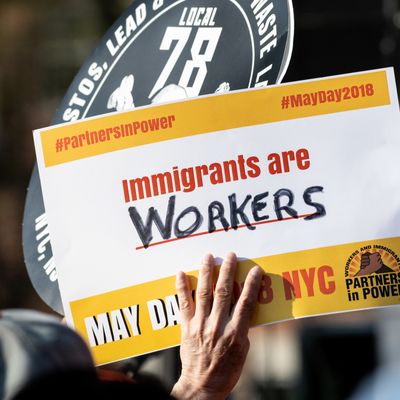
When Kenya Slaughter took a job at Dollar General, she “never planned to become a worker on the front line of a pandemic,” she wrote in the New York Times. To keep her income, she must now risk her health — maybe even her life. In grocery stores and Amazon fulfillment centers, nursing homes and meatpacking plants, millions of workers now find themselves in similar straits: To the corporations that pay them, their work is essential. But their lives are not.
Friday is May Day, known better as Labour Day or International Workers Day in much of the world. In the U.S., hundreds of frontline workers plan to reclaim it for themselves. A coordinated strike will unite workers from Walmart, Postmates, Instacart, Trader Joe’s, FedEx, Target, Amazon and its subsidiary, Whole Foods, in one national effort. Some demands are specific to the pandemic; others they have had for years. Workers need protective gear and sanitary workplaces so they don’t get sick and die. But they also need unions, livable wages, and paid leave.
Instead, of economic justice, workers have received concessions from their employers that are ad hoc, contingent, and mostly temporary. Walmart handed out cash bonuses, and Amazon associates received a $2 raise through May 16. Instacart workers, meanwhile, still need hazard pay. Amazon ends its unlimited unpaid leave policy today. Not only does it restore meaning to May Day, it tells a truth that corporations prefer to bury. Companies like Amazon call their workers heroes, but the praise is often a smokescreen. Behind it, frontline workers are dying, and advocates say widespread corporate negligence bears much of the blame.
At least 20 Walmart associates have died of COVID-19, United for Respect, an advocacy group that represents retail employees, said on Wednesday. But the company still won’t offer universal paid leave. Workers need a positive test or a quarantine order to qualify for a targeted leave policy, and both requirements can be difficult to meet, especially if workers can’t afford doctors. And even existing policies can be unevenly enforced. The relatives of a Walmart associate who died from COVID-19 say that he warned his manager he was ill, only to be told he couldn’t go home. The United Food and Commercial Workers union, which represents thousands of frontline workers in grocery stores, says that 72 of its members have died. For weeks, the union demanded better protective gear and limits on the number of customers allowed into stores. Some grocery chains complied. Others haven’t.
Thousands more frontline workers are sick, and public officials are beginning to notice. In New Jersey, local health department inspectors concluded that conditions in two Amazon fulfillment centers put associates at high risk of infection. The specifics of the company’s negligence are familiar by now: Amazon didn’t protect its workers and made it hard for workers to protect themselves. They couldn’t practice social-distancing, they needed more sanitizing wipes, and the facilities themselves needed to be more thoroughly cleaned. At one of the New Jersey fulfillment centers, over 30 associates had already tested positive for the virus.
The underlying problems here are not new. Decades of laissez-faire economic policy and a well-funded, well-coordinated legislative attack on labor rights was the fuel; the pandemic was merely the spark. The resulting conflagration will engulf the American worker unless politicians and corporate executives alike can be shamed into action. Stronger collective bargaining rights, universal paid leave, and a higher minimum wage would stem much of the bleeding, but this May Day, the pandemic should urge even broader reconsiderations of the status quo. It’s easy to call someone a hero, but more difficult to ask ourselves why they had to show such courage at all.
As grocery store worker Karleigh Frisbie Brogan put it in a piece for The Atlantic, the word “hero,” as applied to essential workers, is “a pernicious label perpetuated by those who wish to gain something — money, goods, a clean conscience — from my jeopardization.” We honor heroes with medals and parades and discounts at Applebee’s. But tokens of appreciation are just that: tokens, which signal nothing deeper than gratitude. That doesn’t pay anyone’s rent.
Essential workers deserve better, not just from their employers but from the public, too. The next disaster will come, and workers will suffer again, unless law and policy catches up to material reality. Capitalism has always sustained itself on a kind of secular human sacrifice. Extract labor from workers, exploit them to maximize profits, and then, when they tire out or die, replace them. With unemployment mounting, Amazon has no shortage of bodies to hire, and no reason, from a business standpoint, to give in to employee demands. Profits look good, even if life inside its warehouses does not. Without more significant checks on corporate power, the economic coercion that sends our grocery store heroes to die will persist, and repeat, without end.
The only force separating corporate greed from a higher coronavirus death toll is organized labor itself. By going on strike, workers make the moral case for their own wellbeing. They aren’t asking to be recognized for their heroism. They want to be compensated for their labor. They want to live.






























